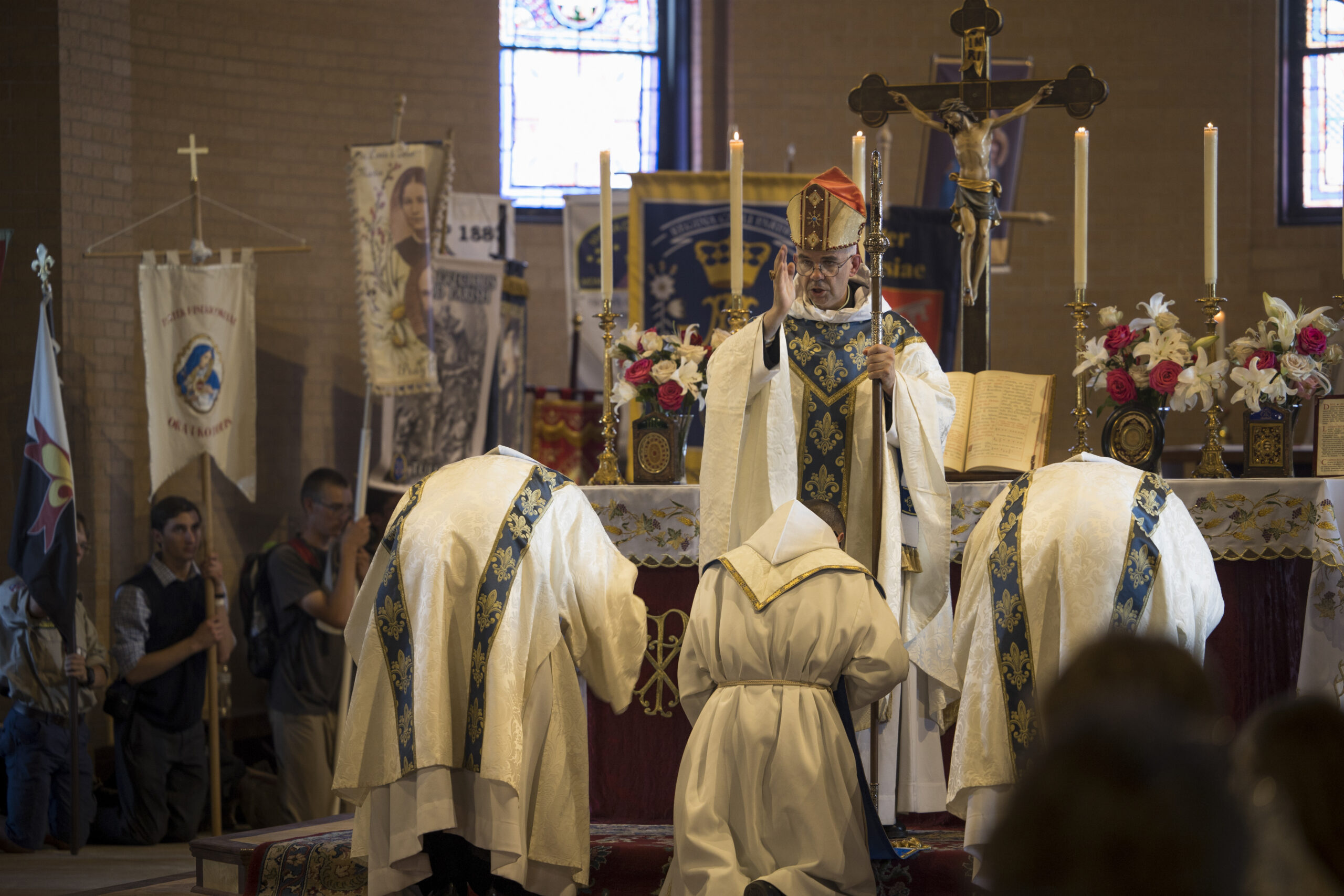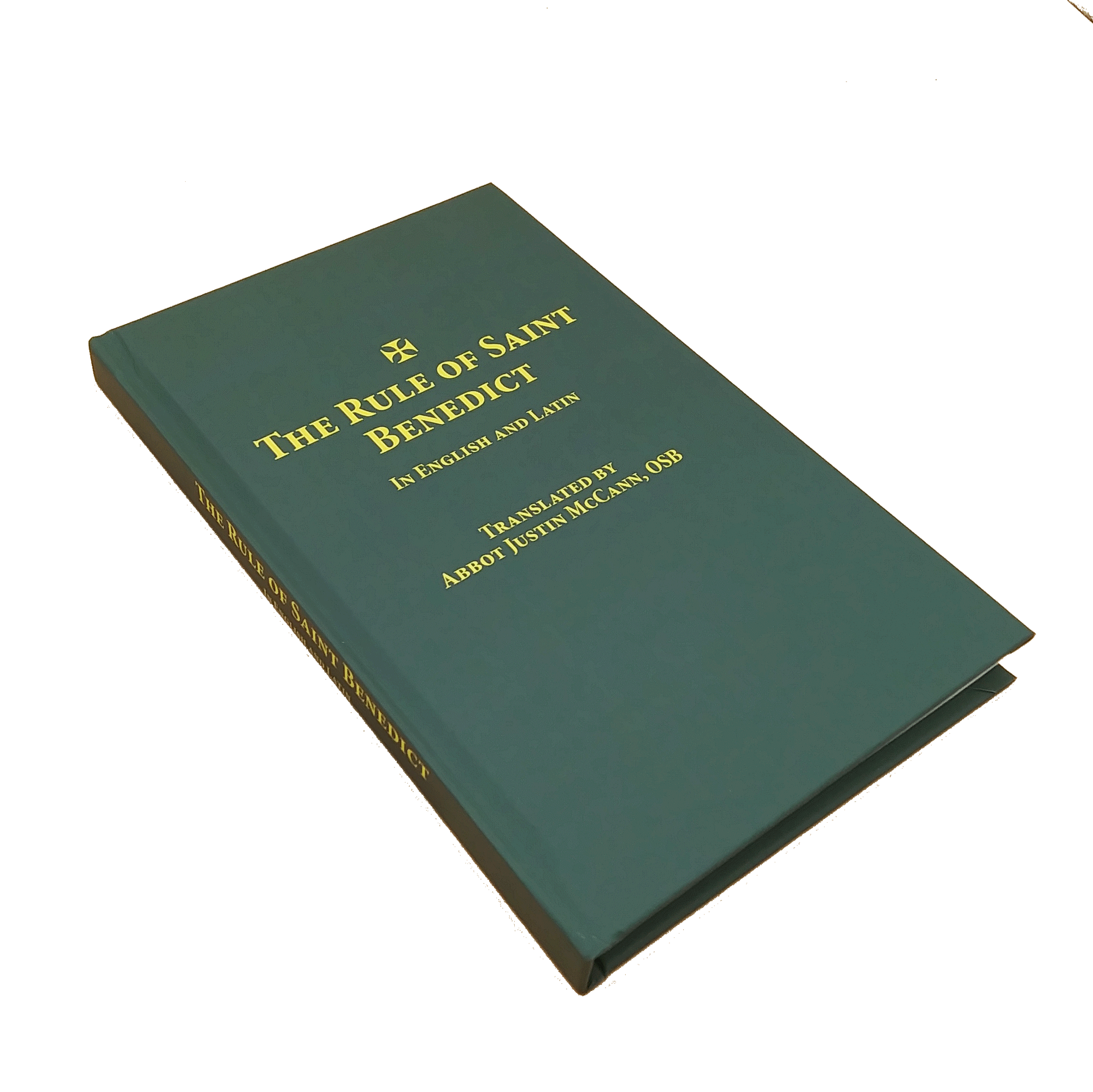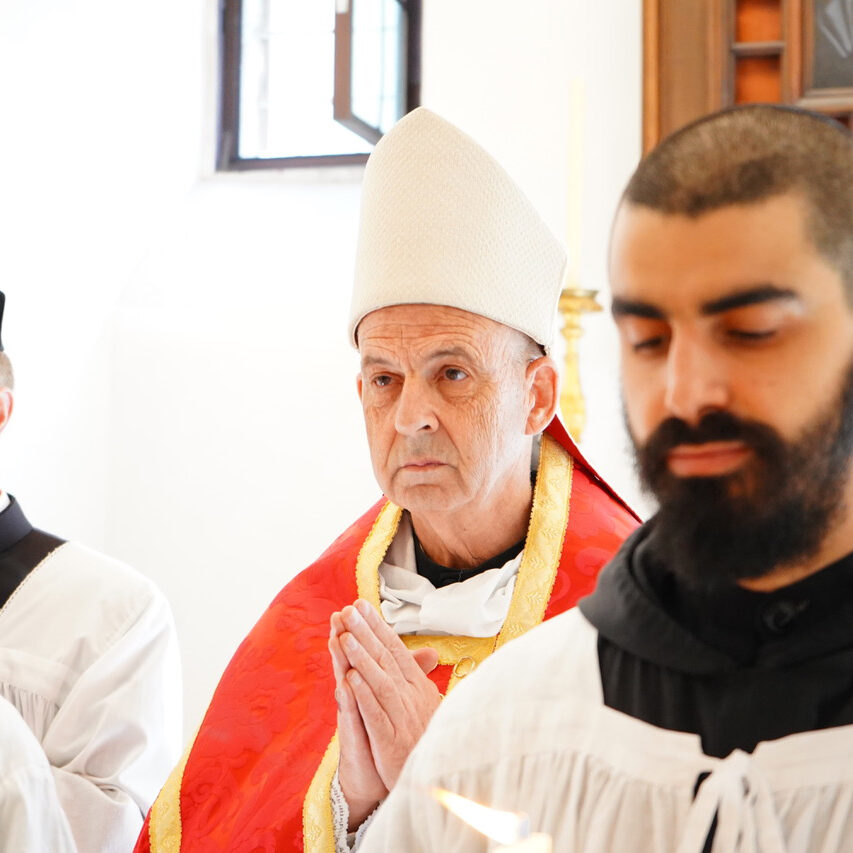Discourse of Father Abbot Antoine Forgeot of Fontgombault Abbey to the families in the neighborhood of Clear Creek, March 19, 2006.
After praying together for the future construction of our monastery, it is a real pleasure for me to meet you all, dear families who have been attracted to this monastery and live close by. With joy I note that history is always repeating itself: nine centuries ago, in France, the little village of Fontgombault was born near the monastery, and the same is true for many towns in Europe…
We hope that you live in peace with everybody. Since you are like a community of families, clearly each family must keep its own privacy and legitimate differences. Just as with flowers, no two families are exactly identical: and it is very good that this is so. Showing respect for such differences and sharing the same goal of faithful Christian life, you should live in full and pleasant harmony. And should there be any difficulties, you can always take inspiration from the Holy Rule of Saint Benedict, which is helpful not only for monks, but also for every man of good will. Saint Benedict says:
“As there is an evil zeal of bitterness which separates from God and leads to hell, so there is a good zeal, which separates from vices and leads to God and to life everlasting. Let monks, therefore, practice this zeal with most fervent love, that is, out-doing one another in showing honor. Let them most patiently endure one another’s infirmities, whether of body or of character. Let them obey one another with rivalry. Let no one follow what he judges good for himself, but rather what seems good for another. Let them show the charity of brotherhood with chaste love. Let them fear God, and love their abbot with sincere and humble affection. Let them prefer nothing whatever to Christ. And may He bring us all alike to life everlasting. Amen” (Chapter 72).
I want to let you know what you can expect to receive from the monastery. First of all, the example of a faithful and fervent community living its vocation of prayer and work, ora et labora, peacefully and seriously while seeking God and His Glory. That is the best thing we can do for you and give you. Secondly, (and secondarily,) you can receive here the support needed for your spiritual life, particularly from the Sacraments, and occasionally from a visit with a Father (normally once a month for thirty minutes should suffice). You are well aware that the monastery is not a parish, and must not become one, so we cannot give you all the services ordinarily provided by a parish.
Next, let me point out what the monastery expects to receive from you: respect of our contemplative vocation, respect of our solitude and silence, which are so important for prayer. We also hope that you will support us by your own prayer, and your children’s prayer — the prayer of a child is so strong upon God’s Heart!
We also hope that you will share our spirit and orientations in the present situation of our beloved Mother the holy Catholic and Roman Church. I note, here in the States just as in Europe, a kind of suspicion of the authorities in the Church, of bishops and even sometimes of Rome and the Holy Father himself. Such a position is not good. It is, on the pretense of orthodoxy, a tendency towards the free examination of the Protestants, where everyone judges for himself what is good and what is not. Here, we have to cultivate the spirit of good sons, filial spirit, of which the Commentary on our Holy Rule speaks. Saint Benedict writes: “the abbot ought not (God forbid) to teach, or ordain, or command anything contrary to the law of the Lord.” And Dom Delatte gives the following commentary: “Saint Benedict’s words are not an invitation to monks to scrutinize their Abbot narrowly, so as to make sure that he is a faithful steward and governs correctly. The filial spirit, in accord with the axiom of common law, will always give the superior the benefit of the doubt. The contrary attitude would tend to debase the authority and weaken all discipline. Men do not need to be encouraged to disobey.” (Comm. p. 38). We have only one Magisterium, that of the Pope, and the bishops united to him.
We are sons of the Church, and this is our security and our joy. We must also be servants of the Church. We must be obedient; we must love the Church, which is nothing other than Jesus Christ Himself. The Church is His Mystical Body. It is clear that here below the Church is still wayfaring, making her way to glory. She is now fighting and often suffering. This has been so from the beginning, and Jesus informed us: “In the world you will have tribulation; but be of good cheer, I have overcome the world” (Jn. 16:33). Remember the parable of the good seed and the weeds. The householder preferred that the servants not gather the weeds too soon, “lest in gathering the weeds,” he said, “you root up the wheat along with them. Let both grow together until the harvest; and at harvest time, I will tell the reapers: ‘Gather the weeds first and bind them in bundles to be burned, but gather the wheat into my barn'” (Mt. 13:29-30).
And most of all, we must remember Our Lord’s promise to Saint Peter, when He gave him the keys of the Kingdom: “I tell you, you are Peter, and on this rock I will build My Church, and the powers of hell shall not prevail against it” (Mt. 16:18).
We are in Peter’s boat, the boat which is the Church, and whatever happens, we are in security there. And we will never have any good reason to leave it, and fall into the sea, in which we will certainly drown. On the contrary, we must always row faithfully following the captain, the Pope, and the Bishops in communion with him.
When we see things that are bad, we cannot say that they are not bad, but we must not make judgments. It is not our task to judge. As Saint Benedict would say, we must “hate the sin, but love sinners.” We must suffer because of the bad things in the Church and offer our suffering in union with the passion of Jesus Christ who bore all the sins of all times on the Cross. He suffered from the present crisis in the Church. He offered the humiliations which His Spouse, the Church, suffers, particularly from the abuses in the celebration of the divine Sacrifice of the Mass.
Concerning this crisis in the liturgy, we have to be careful to be balanced in our opinions, without going to any excess. With regard to the two rites, the Holy Church recognizes that we can have legitimate preferences. That is why, as a loving Mother, She allows the traditional rite. But we must never think or say that the new Mass is a bad Mass, or worse still, that it is invalid. It is always the Holy Mass, the Sacrifice of Jesus offered by the Church to whom He entrusted it when He said: Hoc facite in meant commemorationem. “Do this in memory of Me.”
In all this, we must always be good sons of the Church, in obedience, humility and peace. My predecessor Dom Jean Roy, who worked so hard and suffered so much for the sacred liturgy, and who died suddenly in Rome in 1977, often said to us, his monks: “We ought never to say or do anything that is not theologically sound and in accordance with canon law.” This can be taken as a golden rule. It is the rule we follow at Fontgombault, as well as here at Clear Creek. I hope and pray that all of you never take another way.
May Our Lady, the Mother of the Church, keep you and yours and may she, who is the Mediatrix of all graces, give you all the graces you need. Before ending and answering any questions you may have, I would like to read to you what the Holy Father wrote about Our Lady in the conclusion of his first encyclical letter Deus Caritas est. After proposing the saints as examples of perfect charity, the Pope singles out the Mother of God as the best example. “Mary,” he says, “is a woman of faith, of hope and of love.” In the words of her canticle, Magnificat anima mea Dominum, Mary “expresses her whole program of life, not setting herself at the center, but leaving space for God… Mary’s greatness consists in the fact that she wants to magnify God, not herself. She is lowly; her only desire is to be the handmaid of the Lord. She knows that she will only contribute to the salvation of the world if, rather than carrying out her own projects, she places herself completely at the disposal of God’s initiatives. Mary is a woman of hope: only because she believes in God’s promises and awaits the salvation of Israel, can the angel visit her and call her to the decisive service of these promises. Mary is a woman of faith: ‘Blessed are you who believed’ Elizabeth says to her.’ [And in the Magnificat] we see how her thoughts are attuned to the thoughts of God, how her will is one with the Will of God…
Finally, Mary is a woman who loves. How could it be otherwise?” And again: “The words addressed by the crucified Lord to His disciple, to John, and through him to all the disciples of Jesus: ‘Behold your mother’ are fulfilled anew in every generation. Mary has truly become the Mother of all believers. Men and women of every time and place have recourse to her motherly kindness and her virginal purity and grace, in all their needs and aspirations, their joys and sorrows, their moments of loneliness and their common endeavors. They constantly experience the gift of her goodness and the unfailing love which she pours out from the depths of her heart (…) The devotion of the faithful shows an infallible intuition of how such love is possible: it becomes so as a result of the most intimate union with God, through which the soul is totally pervaded by Him — a condition which enables those who have drunk from the fountain of God’s love to become in their turn a fountain from which ‘flow rivers of living water’ (Jn. 7:38). Mary, Virgin and Mother, shows us what love is and whence it draws it origin, and its constantly renewed power” (nos. 41 and 42).
May she keep all of you and your children under her mantle of purity, charity and joy. Our Lady, Queen of families, pray for us.






